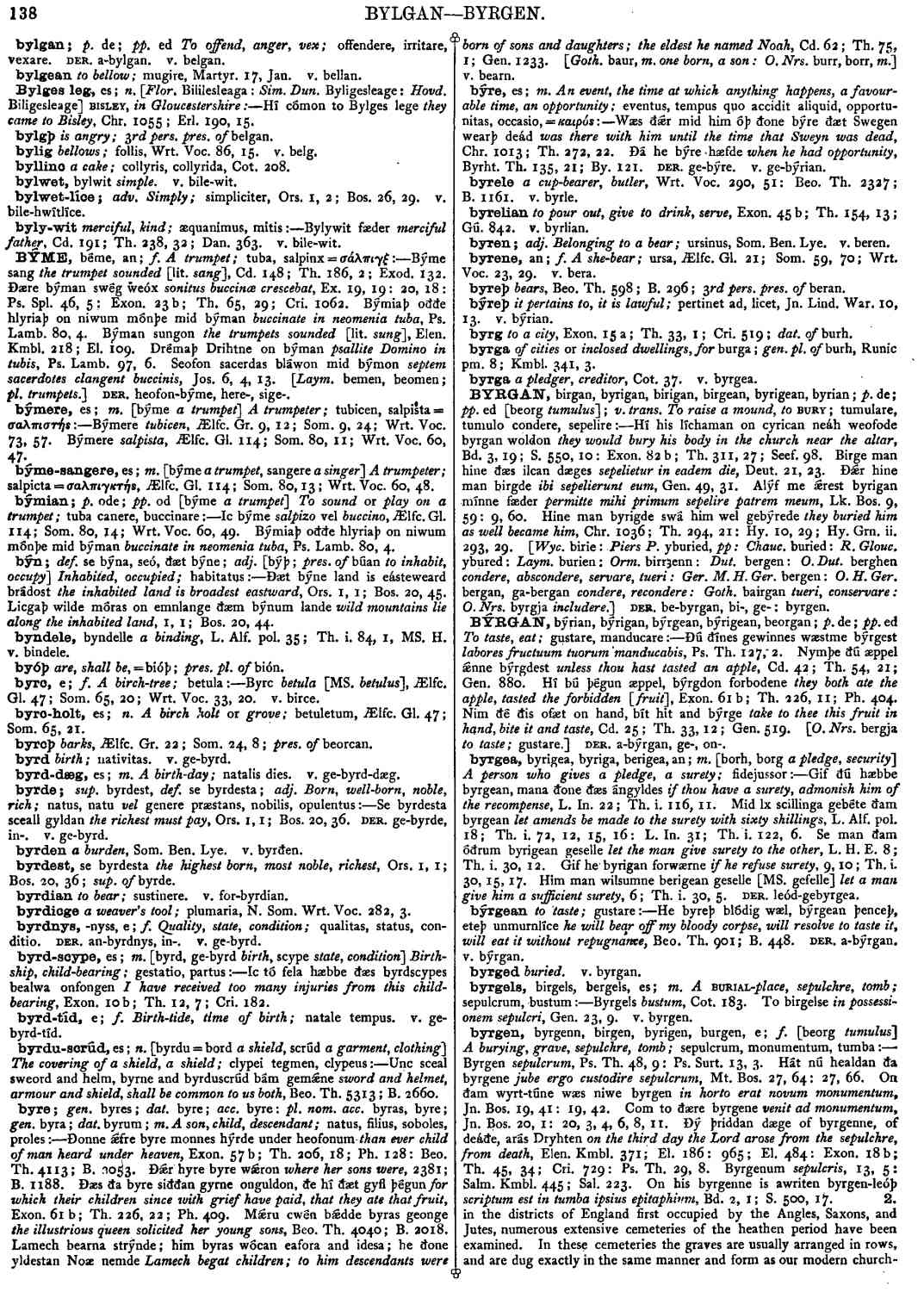byrgen
- noun [ feminine ]
-
Byrgen
sepulcrum,
- Ps. Th. 48, 9: Ps. Surt. 13, 3.
-
Hát nú healdan ða byrgene
jube ergo custodire sepulcrum,
- Mt. Bos. 27, 64: 27, 66.
-
On ðam wyrt-túne wæs niwe byrgen
in horto erat novum monumentum,
- Jn. Bos. 19, 41: 19, 42.
-
Com to ðære byrgene
venit ad monumentum,
- Jn. Bos. 20, 1: 20, 3, 4, 6, 8, 11.
-
Ðý þriddan dæge of byrgenne, of deáðe, arás Dryhten
on the third day the Lord arose from the sepulchre, from death,
- Elen. Kmbl. 371; El. 186: 965; El. 484: Exon. 18b; Th. 45, 34; Cri. 729:
Ps. Th. 29, 8.
-
Byrgenum
sepulcris,
- 13, 5: Salm. Kmbl. 445; Sal. 223.
-
On his byrgenne is awriten byrgen-leóþ
scriptum est in tumba ipsius epitaphium,
- Bd. 2, 1; S. 500, 17.
- Bd. 4, 19; S. 588, 2l;
-
Hit sǽ-líðend syððan hátan Biówulfes biorh
sea-farers may afterwards call it Beowulf's mound [barrow ],
- Beo. Th. 5604-5606; B. 2806, 2807.
-
Him ðá gegiredon Geáta leóde ád unwáclícne, helm-behongen, hilde bordum, and beorhtum byrnum
the people of the Goths then raised for him a mighty funeral pile, hung with helmets, shields, and bright breast-plates,
- 6265-6271; B. 3137-3140.
-
Ongunnon ðá bǽl-fýra mǽst wígend weccan: wudu-réc astáh sweart of Swió-þole
then the warriors began to kindle the greatest of bale-fires: the wood-smoke ascended black from the Swedish pine,
- 6277-6281; B. 3143-3145.
-
Hí on beorg dydon beágas and siglu, eall swylce hyrsta
on the mound they placed rings and jewels, also ornaments,
- 6307-6309; B. 3164, 3165.
-
Ðá ymbe hlǽw ridon æðelingas . . . cyning mǽnan, word-gyd wrecan
then nobles rode round the mound. . . their king bewail, a verbal lay recite,
- 6319-6325; B. 3170-3173.
-
Swá begnornodon Geáta leóde
thus the people of the Goths deplored,
- 6338, 6339; B. 3179.
-
Ge ne scylan fægnigan forþ-farenra manna, ne ðæt líc gesécan, búton eów mann laðige ðǽr-to: ðænne ge ðǽr-to gelaðode sýn, ðonne forbeóde ge ða hǽðenan sangas ðæra lǽwedra manna, and heora hlúdan cheahchetunga; ne ge sylfe ne eton, ne ne drincon ðǽr ðæt líc inne líþ, ðe-læs ðe ge syndon efen-lǽce ðæs hǽðenscypes ðe hý ðǽr begáþ
ye shall not rejoice on account of men deceased, nor attend on the corpse, unless ye be thereto invited: when ye are thereto invited, then forbid ye the heathen songs of the laymen, and their loud cachinations; nor eat ye, nor drink, where the corpse lieth therein, lest ye be imitators of the heathenism which they there commit,
- L. Ælf. C. 35; Th. ii. 356, 23-358, 5.
-
The clergy gave little attention to these injunctions, for they are warned against being 'hunters of funerals,' and Ælfric tells us how some priests 'Fægniaþ ðonne men forþfaraþ, and unbedene gaderiaþ hí to ðam líce, swá swá grǽdige ræmmas, ðár ðár hí hold geseóþ; ac heom gebíraþ mid rihte to bestandenne ða men, ðe híraþ into heora mynstre; and ne sceal nán faran on óðres folgoþ to nánum líce búton he gebeden sý
rejoice when men depart hence, and unbidden gather about the corpse, like greedy ravens, wherever they see a dead carcase; whereas it properly becomes them to bury those men, who belong to their minster; and no one ought to go in another's following to any corpse unless he be invited,'
- L. Ælf. P. 49; Th. ii. 386, 2-6.
-
Gearwodan hí his líchoman to bebyrigeanne on stǽnenre þruh
cujus [Sebbi] corpori tumulando præparaverant sarcofagum lapideum,
- Bd. 4, 11; S. 580, 4.
Bosworth, Joseph. “byrgen.” In An Anglo-Saxon Dictionary Online, edited by Thomas Northcote Toller, Christ Sean, and Ondřej Tichy. Prague: Faculty of Arts, Charles University, 2014. https://bosworthtoller.com/5606.
Checked: 0